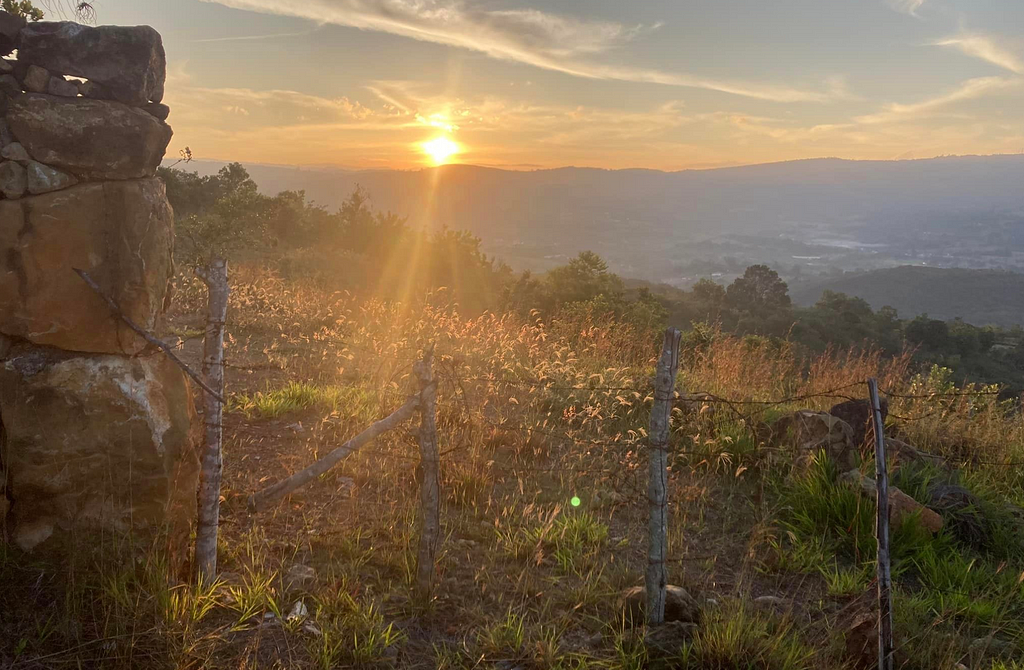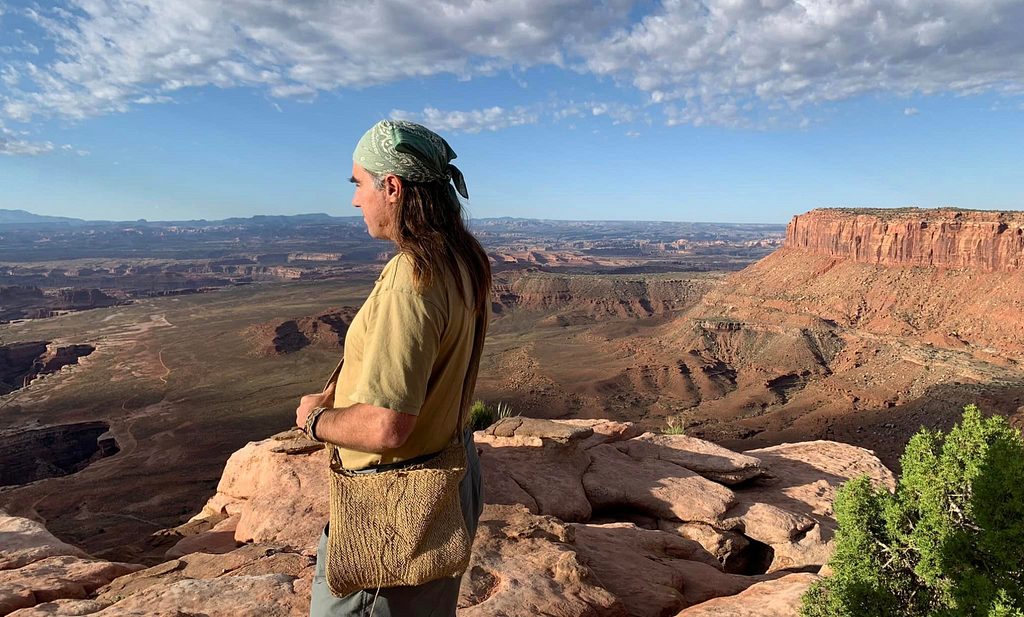
By: The Posts Author | Posted on: 30 Oct 24
Josh Leonard sits down with Gail Hochachka and Lisa Gibson, leaders of the SALT for Climate initiative, to explore their pioneering approach to climate action. They discuss the often-overlooked psychological and social dimensions of climate work, share insights from their work on collective sensemaking and leadership training, and explain why a focus on human dynamics may be the missing piece in our response to the climate crisis. This post was originally published on Integral Life.
Josh Leonard sits down with Gail Hochachka and Lisa Gibson, leaders of the SALT for Climate initiative, to explore their pioneering approach to climate action. They discuss the often-overlooked psychological and social dimensions of climate work, share insights from their work on collective sensemaking and leadership training, and explain why a focus on human dynamics may be the missing piece

By: The Posts Author | Posted on: 17 Oct 24
In this short 14-minute video, we give you an exclusive inside look at Overflowing Purpose, a transformative new course that brings together renowned thinkers like Ken Wilber, John Vervaeke, Robb Smith, Cindy Wigglesworth, Gail Hochachka, Peter Merry, Greg Thomas, and others to address the complex challenges of our time — and your unique role in meeting those challenges. This post was originally published on Integral Life.
In this short 14-minute video, we give you an exclusive inside look at Overflowing Purpose, a transformative new course that brings together renowned thinkers like Ken Wilber, John Vervaeke, Robb Smith, Cindy Wigglesworth, Gail Hochachka, Peter Merry, Greg Thomas, and others to address the complex challenges of our time — and your unique role in meeting those challenges. This post
By: The Posts Author | Posted on: 17 Sep 24
The New Discourses Podcast with James Lindsay, Episode 148 Karl Marx characterized Communism as “the negation of the negation,” which is a peculiar turn of phrase he borrowed from his theoretical predecessor G.W.F. Hegel. What that means is that propertied societies, whether slave, feudal, or capitalist, negate our innate Communist (“social”) nature, and then Communism in turn negates capitalism as the highest form of development of the productive organizational modes of society. Well, the negation of the negation experiment was run in various parts of the world through the 20th century and failed everywhere, and what we learned is that the negation of the negation is actually
The New Discourses Podcast with James Lindsay, Episode 148 Karl Marx characterized Communism as “the negation of the negation,” which is a peculiar turn of phrase he borrowed from his theoretical predecessor G.W.F. Hegel. What that means is that propertied societies, whether slave, feudal, or capitalist, negate our innate Communist (“social”) nature, and then Communism in turn negates capitalism as the highest form of development of the

By: The Posts Author | Posted on: 4 Jun 24
This is an essay written on June 8, 2018 when I was the director for the Center for Applied Cultural Evolution I am reposting it as part of the original 3-part series from that time. Find Part 1 here and Part 2 here.Let me begin by acknowledging those who came before me. The runner-up for a 1 billion euro grant from the European Union nearly a decade ago was FuturICT with their vision for modeling complex social systems to avoid (or manage) future economic collapses. So I am not the first person to propose that a massive effort is needed to
This is an essay written on June 8, 2018 when I was the director for the Center for Applied Cultural Evolution I am reposting it as part of the original 3-part series from that time. Find Part 1 here and Part 2 here.Let me begin by acknowledging those who came before me. The runner-up for a 1 billion euro grant from

By: The Posts Author | Posted on: 4 Jun 24
This is an essay written on June 1, 2018 when I was the director for the Center for Applied Cultural Evolution I am reposting it as part of the original 3-part series from that time. Find Part 2 here and Part 3 here.Let me start by saying that literally every social problem humanity now confronts will benefit from taking a rigorous, evidence-based approach to developing interventions that work. If I believe this — you might wonder — why would I title an article this way?The answer is simply that I have been trying to manifest into the world a science of large-scale social change for 18
This is an essay written on June 1, 2018 when I was the director for the Center for Applied Cultural Evolution I am reposting it as part of the original 3-part series from that time. Find Part 2 here and Part 3 here.Let me start by saying that literally every social problem humanity now confronts will benefit from taking a rigorous,
By: The Posts Author | Posted on: 15 Feb 24
Climate change researcher, sustainable development expert, and activist Gail Hochachka works on the front lines of climate change research, asking—and answering—questions like: How does the way we make meaning, at all our different stages of development, relate to the ways we act on climate change? How can we foster more engagement with climate change? Is climate action scalable? And how are we going to show up for the people who are facing the greatest impacts? This post was originally published on Integral Life.
Climate change researcher, sustainable development expert, and activist Gail Hochachka works on the front lines of climate change research, asking—and answering—questions like: How does the way we make meaning, at all our different stages of development, relate to the ways we act on climate change? How can we foster more engagement with climate change? Is climate action scalable? And how
By: The Posts Author | Posted on: 26 Dec 22
It is time to activate a planetary network of bioregional learning centers… engaging at least 100 in the next year.Earth Regenerators turns three on December 29th… and we have come such a long way. I just re-read Birthing the Design School Next Year (in 2021) that was written more than two years ago. It felt like looking into a crystal ball and seeing that we actually did what we set out to do.Here is what we set out to do in the following year:If you go on to read Earth Regenerators in 2022, you will see that we were successful on all
It is time to activate a planetary network of bioregional learning centers… engaging at least 100 in the next year.Earth Regenerators turns three on December 29th… and we have come such a long way. I just re-read Birthing the Design School Next Year (in 2021) that was written more than two years ago. It felt like looking into a crystal ball
By: The Posts Author | Posted on: 22 Apr 22
This week I address a listener’s question about a fascinating subculture arising in the environmental movement: the “post-doomers”, people who, as she writes, “hold the idea that the collapse of civilization as we know it is already well underway, is unstoppable, and will be felt by us here in Comfortable Land through disruption of many kinds in the not-too-distant future.” Post-doomers find meaning in surrendering to this inevitable doom, much as a hospice patient might find peace – even joy – in the acceptance of their death. Or that their loved ones might find in reconciliation and morning. I’m not
This week I address a listener’s question about a fascinating subculture arising in the environmental movement: the “post-doomers”, people who, as she writes, “hold the idea that the collapse of civilization as we know it is already well underway, is unstoppable, and will be felt by us here in Comfortable Land through disruption of many kinds in the not-too-distant future.”
By: The Posts Author | Posted on: 22 Apr 22
This week I address a listener’s question about a fascinating subculture arising in the environmental movement: the “post-doomers”, people who, as she writes, “hold the idea that the collapse of civilization as we know it is already well underway, is unstoppable, and will be felt by us here in Comfortable Land through disruption of many kinds in the not-too-distant future.” Post-doomers find meaning in surrendering to this inevitable doom, much as a hospice patient might find peace – even joy – in the acceptance of their death. Or that their loved ones might find in reconciliation and morning. I’m not
This week I address a listener’s question about a fascinating subculture arising in the environmental movement: the “post-doomers”, people who, as she writes, “hold the idea that the collapse of civilization as we know it is already well underway, is unstoppable, and will be felt by us here in Comfortable Land through disruption of many kinds in the not-too-distant future.”

By: The Posts Author | Posted on: 26 Oct 20
An interview with Vincent Ialenti, author of Deep Time ReckoningInside Finland’s Olkiluoto nuclear waste repository, 1,500 feet underground. Photo Credit: Peter GuenzelWith half-lives ranging from 30 to 24,000, or even 16 million years, the radioactive elements in nuclear waste defy our typical operating time frames. The questions around nuclear waste storage — how to keep it safe from those who might wish to weaponize it, where to store it, by what methods, for how long, and with what markings, if any, to warn humans who might stumble upon it thousands of years in the future — require long-term thinking.These questions brought the anthropologist Vincent Ialenti
An interview with Vincent Ialenti, author of Deep Time ReckoningInside Finland’s Olkiluoto nuclear waste repository, 1,500 feet underground. Photo Credit: Peter GuenzelWith half-lives ranging from 30 to 24,000, or even 16 million years, the radioactive elements in nuclear waste defy our typical operating time frames. The questions around nuclear waste storage — how to keep it safe from those who might wish to
- 1
- 2







